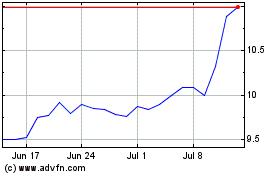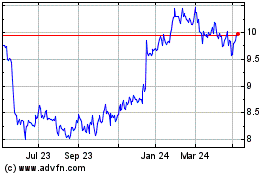After Universal Music, What Will Vivendi's Encore Be? -- Heard on the Street
December 18 2020 - 11:59AM
Dow Jones News
By Stephen Wilmot
While the pandemic has silenced concert halls around the globe
this year, the world's largest music companies have had plenty of
excuses to party. The latest is Chinese tech giant Tencent's move
to double its 10% stake in Universal Music Group.
The deal announced Friday should bolster investor confidence in
Vivendi, which will still own the remaining 80% of UMG. The rub is
that the French media company's outside shareholders aren't in
control of what it does with the cash raised. Vincent Bolloré, the
billionaire who steers the company via his family vehicle, has a
record of controversial investments.
Tencent's decision to double down on Santa Monica, Calif.-based
UMG, the largest of the "big three" companies that own rights to
most of the world's recorded music, isn't a huge surprise. It
agreed to buy 10% last year at a total company valuation of EUR30
billion, equivalent to $36.8 billion, with the option to buy
another 10% at the same valuation by Jan. 15, 2021 -- an option it
is now exercising. The price tag seemed high at the time, but
meanwhile stock markets have enthusiastically tuned into the music
industry. Shares of Warner Music Group, another of the big three,
have risen 44% since their initial public offering in June, while
Spotify stock has more than doubled this year.
UMG hasn't been immune to Covid-19, but its symptoms have been
relatively mild. In the second quarter, when much of the Western
world was locked down, its revenues fell less than 5% after
stripping out currency and portfolio changes, as a collapse in CD,
merchandising and other revenues typically dependent on physical
interactions was partly offset by further growth in streaming. In
the third quarter, UMG's revenues rose 6.1% -- slower than before
the pandemic but nothing to worry about.
For Vivendi investors, the drama has been elsewhere. Most
notably, the company has accumulated a roughly 27% stake in
Lagardère, an underperforming French conglomerate, and teamed up
with an activist hedge fund to push for board seats. Bernard
Arnault, the controlling shareholder of LVMH Moët Hennessy Louis
Vuitton and Europe's richest man, has taken a smaller stake in
support of the founding family that still runs Lagardère.
Publicly, Vivendi has said only that it sees value in Lagardère.
That has left ample scope for speculation in the French press that
Vivendi might be interested in parts of Lagardère's book publisher
Hachette, or a radio station called Europe 1. Reuters reported
Thursday that centrist President Emmanuel Macron's reelection
campaign is worried about Mr. Bolloré consolidating media assets
into a kind of French Fox News with a right-wing agenda. That might
explain the otherwise puzzling involvement of Mr. Arnault, a Macron
supporter. Vivendi already owns Canal+, a big French pay-TV
company.
The melee embodies both the opportunities and risks for Vivendi
investors. Mr. Bolloré has grown rich through canny investments, of
which the stake in Lagardère -- acquired during the worst of the
pandemic -- might be another example. But he gives other
shareholders few clues as to a strategy that can appear strange.
Selling fast-growing UMG and buying a book publisher would be a
contrarian trade.
The questions surrounding Vivendi's other interests will grow
more urgent as it moves toward an initial public offering of UMG,
planned for 2022. At that point, music will become a less dominant
chunk of the company's portfolio and the stock will dance to
another tune -- one chosen by Mr. Bolloré.
Write to Stephen Wilmot at stephen.wilmot@wsj.com
(END) Dow Jones Newswires
December 18, 2020 11:44 ET (16:44 GMT)
Copyright (c) 2020 Dow Jones & Company, Inc.
Vivendi (EU:VIV)
Historical Stock Chart
From Mar 2024 to Apr 2024

Vivendi (EU:VIV)
Historical Stock Chart
From Apr 2023 to Apr 2024
